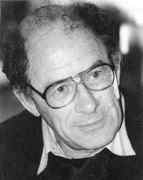Person: Arnold, Vladimir Igorevich

Vladimir Arnold is a Ukranian-born mathematician who won a Wolf prize for his work on dynamical systems, differential equations and singularity theory.
Mathematical Profile (Excerpt):
- Arnold continued to study as a postgraduate student at Moscow State University for his Candidate's Degree (equivalent to a Ph.D.) still with Kolmogorov as advisor.
- Following the award, Arnold was promoted.
- In 1965 Arnold became a Professor in the Faculty of Mechanics and Mathematics at Moscow State University, a position he held until 1986 when he took up the position of Principal Researcher at the Steklov Institute of Mathematics in Moscow.
- Arnold's Ph.D. thesis contained a solution to Hilbert's 13th problem.
- His work on Hamiltonian dynamics, which includes cocreation of KAM (Kolmogorov- Arnold- Moser) theory and the discovery of "Arnold diffusion", made him world famous at an early age.
- Arnold's contributions to the theory of singularities complement Thom's catastrophe theory and have transformed this field.
- Arnold has also made innumerable and fundamental contributions to the theory of differential equations, symplectic geometry, real algebraic geometry, the calculus of variations, hydrodynamics, and magneto- hydrodynamics.
- Indeed the number of different disciplines in which Arnold has worked is truly astounding.
- He published Problèmes ergodiques de la mécanique classique Ⓣ(Ergodic problems of classical mechanics) (with A Avez) (1967), Ordinary differential equations (Russian) (1971), Mathematical methods of classical mechanics (Russian) (1974), Supplementary chapters to the theory of ordinary differential equations (Russian) (1978), Singularity theory (1981), Singularities of differentiable mappings (Russian) (with A N Varchenko and S M Gusein-Zade) (1982), Catastrophe theory (1984), Huygens and Barrow, Newton and Hooke (Russian) (1989), Contact geometry and wave propagation (1989), Singularities of caustics and wave fronts (1990), The theory of singularities and its applications (1991), Topological invariants of plane curves and caustics (1994), Lectures on partial differential equations (Russian) (1997), Topological methods in hydrodynamics (with B A Khesin) (1998), and Arnold problems (Russian) (2000).
- One of the most celebrated ones is Arnold's seminar, existing for more than 30 years.
- Arnold discussed about a dozen research problems with detailed comments.
- According to Arnold, the half-life of a problem is seven years.
- Many seminar participants are Arnold's graduate students.
- His philosophy is that a student should learn from his teacher that a certain problem is open; the choice of a particular research problem is then up to the student (to quote from Arnold's Preface: "To choose a problem for him is like choosing a bride for one's son").
- Arnold has been honoured throughout the world.
- In addition to these honours, Arnold has been awarded honorary degrees from the University P and M Curie, Paris (1979), Warwick University, Coventry (1988), Utrecht University, Netherlands (1991), University of Bologna, Italy (1991), University Complutense, Madrid (1994), and the University of Toronto, Canada (1997).
- Arnold is openly critical of the education system of many countries.
- Arnold has also been critical of the French education system.
- Arnold reached 65 years of age in 2002 and the Moscow Mathematical Journal devoted two issues to papers dedicated to celebrate the occasion.
- Arnold is a rare teacher, his school is famous and numerous, he has a special gift for finding new beautiful problems to interest and involve young researchers.
- Arnold was awarded the State Prize of the Russian Federation (2007), and in the following year he received the prestigious Shaw Prize in mathematical sciences.
- Arnold also produced extremely fruitful ideas, relating classical mechanics to questions of topology.
- This includes the famous "Arnold Conjecture" which has only recently seen important progress.
- The next significant breakthrough was made by Arnold a century later and this has provided the basis for more recent work.
Born 12 June 1937, Odessa, USSR (now Ukraine). Died 3 June 2010, Paris, France.
View full biography at MacTutor
Tags relevant for this person:
Origin Ukraine, Prize Shaw, Prize Wolf
Thank you to the contributors under CC BY-SA 4.0! 

- Github:
-

- non-Github:
- @J-J-O'Connor
- @E-F-Robertson
References
Adapted from other CC BY-SA 4.0 Sources:
- O’Connor, John J; Robertson, Edmund F: MacTutor History of Mathematics Archive
